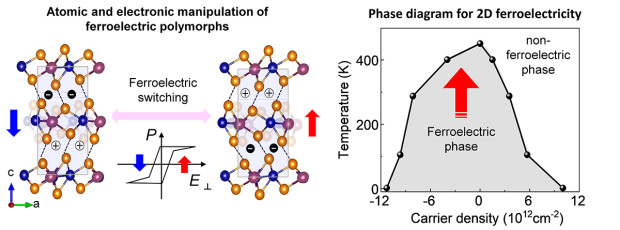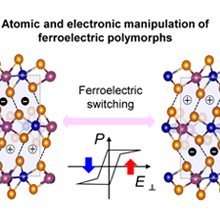본문
Atomic and Electronic Manipulation of Robust Ferroelectric Polymorphs

By prof. Suyeon Cho,
Chemical Engineering and Materials Science
Research Profile
s.cho@ewha.ac.kr
Achieving ferroelectricity in atomically thin materials has long been an issue in physics and industry-level research. Layered polymorphic TMDs provide breakthroughs for atomically thin ferroelectric materials. The absence of dangling bonds and stable two-dimensional (2D) polar structures of TMDs (e.g., MoTe2 and WTe2) can lead to unconventional forms of ferroelectricity, where unprecedented device operations, such as direct current flows through 2D ferroelectric materials, have been reported. However, inhomogeneous defects and low electric polarization at room temperature remain as critical issues preventing the realization of practical ferroelectric devices; thus, investigating new physical parameters and phase diagrams for unconventional ferroelectricity are the necessary next steps to take to utilize the emerging 2D ferroelectricity.

Figure | Atomic and electronic manipulation of 2D ferroelectric polymorphs (left). Phase diagram, newly built for ferroelectricity in 2D geometry (right), where the red arrow indicated an increase in the robustness of ferroelectricity by atomic and electronic manipulation, as described in the figure on the left.
In this research, the atomic and electronic manipulation of ferroelectric polymorphs in Mo1-xWxTe2 achieves robust and gate-tunable ferroelectric switching in an atomically thin geometry above room temperature. Hexagonal (2H), monoclinic (1T'), and orthorhombic (Td) phases are involved in the polymorphic control, not relying on unstable and inhomogeneous defects. The substitution of tungsten for molybdenum atoms in Mo1-xWxTe2 plays a role in the chemical pressure and electric doping, allowing phase engineering for robust ferroelectricity via effective inversion symmetry breaking and phonon hardening above T = 400 K. We showed a critical carrier density of 1.1×1013 cm-2 that allows electric polarization to be retained, and we devise an original phase diagram of ferroelectricity in atomically thin semimetals. Our atomic and electronic manipulation of ferroelectric polymorphs provides new insight into 2D ferroelectricity and paves the way toward original devices for "in-memory computing."
* Related Article
Yonas Assefa Eshete, Kyungrok Kang, Seunghun Kang, Yejin Kim, Phuong Lien Nguyen, Deok-Yong Cho, Yunseok Kim, Jaekwang Lee, Suyeon Cho, Heejun Yang, Atomic and Electronic Manipulation of Robust Ferroelectric Polymorphs, ADVANCED MATERIALS, Volume34, Issue31 August, 2022
